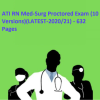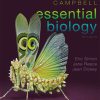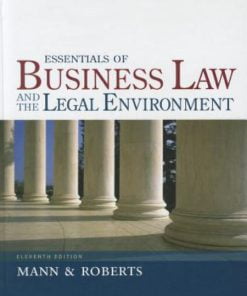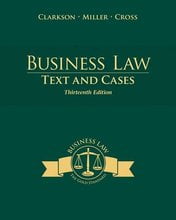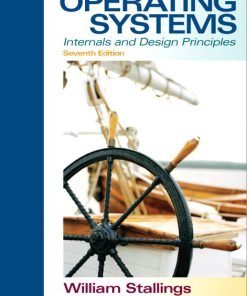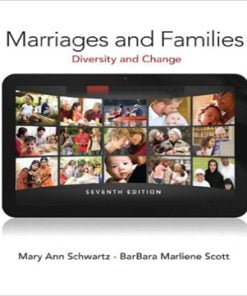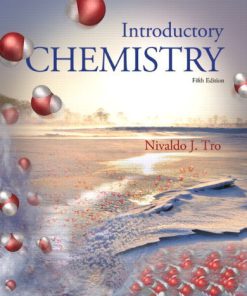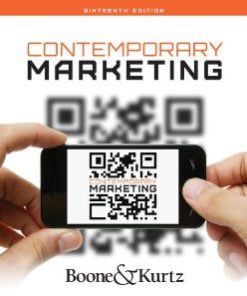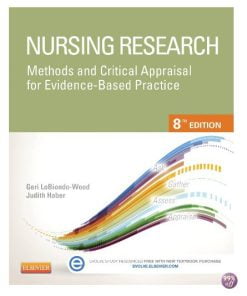Test Bank for Anatomy Physiology and Disease 3rd Edition by Colbert
$35.00 Original price was: $35.00.$26.50Current price is: $26.50.
Test Bank for Anatomy Physiology and Disease 3rd Edition by Colbert
This is completed downloadable of Test Bank for Anatomy Physiology and Disease 3rd Edition by Colbert
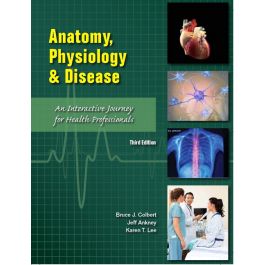
Product Details:
- ISBN-10 : 0134876369
- ISBN-13 : 978-0134876368
- Author: Colbert
This is the eBook of the printed book and may not include any media, website access codes, or print supplements that may come packaged with the bound book. For courses in anatomy & physiology for health professions, and comprehensive medical assisting. Where A&P meets pathology: A stimulating exploration Anatomy, Physiology, & Disease: An Interactive Journey for Health Professionals provides an engaging introduction to interrelationships in A&P and pathology, with emphasis on clinical applications. Conversational and humorous, the text uses real-world analogies to enable true understanding – rather than memorization – and to create lasting connections. The 3rd edition presents the latest research and clinical applications in human A&P, plus new visual aids and practice opportunities. A student workbook, available separately, offers interactive exam prep resources, including concept maps and crossword puzzles. New! Also available with MyLab Health Professions By combining trusted author content with digital tools and a flexible platform.
Table of Content:
- Brief Contents
- Anatomy, Physiology, & Disease An Interactive Journey for Health Professionals
- Anatomy, Physiology, & Disease An Interactive Journey for Health Professionals
- Dedications
- Contents
- Special In-Text Features Directory Listing
- About the Authors
- Contributing Authors
- Preface
- New to This Edition
- What Is NOT New to This Edition
- Resources
- Reviewers
- A User’s Guide to the Features of the Book
- MyLab Health Professions with Pearson eText
- 1 Anatomy, Physiology, and Disease
- Learning the Language and Customs
- Learning Outcomes
- What Is Anatomy and Physiology?
- Anatomy
- Physiology
- Putting It All Together
- What Is Disease?
- Test Your Knowledge 1–1
- The Language
- Medical Terminology
- Abbreviations
- Test Your Knowledge 1–2
- The Metric System
- Anatomy, Physiology, and Disease Concepts You Will Encounter on Your Journey
- Metabolism
- Homeostasis
- Disease Concepts
- Test Your Knowledge 1–3
- The Body’s Defense System
- Body Barriers
- Understanding Routes of Transmission
- Standard Precautions
- Test Your Knowledge 1–4
- Summary
- Snapshots from the Journey
- Review Questions
- Multiple Choice
- Fill in the Blank
- Short Answer
- Suggested Activities
- 2 The Human Body
- Reading the Map
- Learning Outcomes
- The Map of the Human Body
- Body Positions
- Test Your Knowledge 2–1
- Body Planes and Directional Terms
- Additional Directional Terms
- Test Your Knowledge 2–2
- Body Cavities
- Body Regions
- Test Your Knowledge 2–3
- Test Your Knowledge 2–4
- Radiology: The Science of Viewing the Body
- X-Rays (Radiograph or Roentgenogram)
- Computerized Tomography (CT or CAT Scan)
- Magnetic Resonance Imaging (MRI)
- Ultrasound (Sonography)
- Summary
- Snapshots from the Journey
- Review Questions
- Multiple Choice
- Fill in the Blank
- Short Answer
- Suggested Activities
- 3 Biochemistry
- The Basic Ingredients of Life
- Learning Outcomes
- Atoms, Elements, and Ions
- Ions and Electrolytes
- Molecular Bonding
- Acids and Bases
- Water
- Solutions
- Test Your Knowledge 3–1
- Biological Molecules
- Carbohydrates
- Lipids
- Proteins
- Nucleic Acids
- Test Your Knowledge 3–2
- Metabolism
- Enzymes: Making Reactions Happen
- Cellular Respiration and Adenosine Triphosphate (ATP): The Energy Molecule
- Test Your Knowledge 3–3
- Summary
- Snapshots from the Journey
- Review Questions
- Multiple Choice
- Fill in the Blank
- Short Answer
- 4 The Cells
- The Raw Materials And Building Blocks
- Learning Outcomes
- Overview of Cells
- Cell Structure
- Cell Membrane
- Transport Methods
- Passive Transport
- Diffusion
- Osmosis
- Filtration
- Facilitated Diffusion (Carrier-Mediated Passive Transport)
- Active Transport
- Active Transport Pumps (Carrier-Mediated Active Transport)
- Endocytosis
- Exocytosis
- Test Your Knowledge 4–1
- Cell Components
- Cytoplasm
- Nucleus and Nucleolus
- Ribosomes
- Centrosomes
- Mitochondria
- Endoplasmic Reticulum
- Golgi Apparatus
- Lysosomes
- Other Interesting Parts
- Test Your Knowledge 4–2
- Cellular Reproduction
- Cellular Mitosis
- The Cell Cycle
- The Phases of Mitosis
- Mitosis in Your Body
- Test Your Knowledge 4–3
- Microorganisms
- Bacteria
- Viruses
- Fungi
- Protozoa
- Prions
- Summary
- Snapshots from the Journey
- Review Questions
- Multiple Choice
- Matching
- Short Answer
- Suggested Activities
- 5 Tissues and Systems
- The Inside Story
- Learning Outcomes
- Overview of Tissues
- Tissue Types
- Epithelial Tissue
- Membranes
- Connective Tissue
- Connective Tissue Proper
- Muscle Tissue
- Skeletal Muscle
- Cardiac Muscle
- Smooth Muscle
- Nervous Tissue
- Meningitis and Vaccinations
- Test Your Knowledge 5–1
- Organs
- Systems
- Skeletal System
- Muscular System
- Integumentary System
- Nervous System
- Endocrine System
- Cardiovascular System
- Respiratory System
- Lymphatic and Immune System
- Gastrointestinal (Digestive) System
- Urinary System
- Reproductive System
- Test Your Knowledge 5–2
- Summary
- Snapshots from the Journey
- Review Questions
- Multiple Choice
- Fill in the Blank
- Short Answer
- Suggested Activities
- 6 The Skeletal System
- The Framework
- Learning Outcomes
- System Overview: More Than the “Bare Bones” About Bones
- General Bone Classification
- Basic Bone Anatomy
- Bone Tissue
- Surface Structures of Bones
- Bone Growth and Repair
- Test Your Knowledge 6–1
- Cartilage
- Joints and Ligaments
- Test Your Knowledge 6–2
- Movement Classification
- Test Your Knowledge 6–3
- The Skeleton
- Special Regions of the Skeletal System
- The Skull
- The Bony Thorax
- The Spinal Column
- Upper and Lower Extremities
- Test Your Knowledge 6–4
- Maintaining Good Bone Health
- Summary
- Snapshots from the Journey
- Review Questions
- Multiple Choice
- Fill in the Blank
- Short Answer
- Suggested Activities
- 7 The Muscular System
- Movement for the Journey
- Learning Outcomes
- Overview of the Muscular System
- Types of Muscles
- Test Your Knowledge 7–1
- Skeletal Muscles
- Skeletal Muscles of Specific Body Regions
- Facial Skeletal Muscles.
- Anterior and Posterior Trunk Skeletal Muscles.
- Skeletal Muscles of the Arm and Shoulder.
- Skeletal Muscles of the Legs.
- Skeletal Muscle Movement
- Contraction and Relaxation
- Movement Terminology
- Test Your Knowledge 7–2
- Muscular Movement at the Cellular Level
- The Functional Unit of the Muscle
- Important Ingredients: ATP and Calcium
- Muscular Fuel
- Test Your Knowledge 7–3
- Visceral or Smooth Muscle
- Cardiac Muscle
- Summary
- Snapshots from the Journey
- Review Questions
- Multiple Choice
- Fill in the Blank
- Short Answer
- Suggested Activities
- 8 The Integumentary System
- The Protective Covering
- Learning Outcomes
- System Overview
- Integumentary System Functions
- The Skin
- Epidermis
- Dermis
- Sweat and Sebaceous Glands
- Subcutaneous Fascia
- Infections of the Skin
- Warts
- Fungi
- Other Infections of the Skin
- Test Your Knowledge 8–1
- How Skin Heals
- Nails
- Hair
- Test Your Knowledge 8–2
- Temperature Regulation
- Summary
- Snapshots from the Journey
- Review Questions
- Multiple Choice
- Fill in the Blank
- Short Answer
- Suggested Activities
- 9 The Nervous System
- The Body’s Control Center
- Learning Outcomes
- Organization
- The Parts and Basic Operation of the Nervous System
- Nervous Tissue
- Neuroglia
- Neurons
- Test Your Knowledge 9–1
- How Neurons Work
- Excitable Cells
- Action Potentials
- Local Potentials
- Impulse Conduction
- How Synapses Work
- Chemical Synapses
- Electrical Synapses
- Test Your Knowledge 9–2
- Spinal Cord and Spinal Nerves
- External Anatomy of the Spinal Cord
- Meninges
- Internal Anatomy of the Spinal Cord
- Spinal Nerves
- Reflexes
- Test Your Knowledge 9–3
- The Brain and Cranial Nerves
- The Brain’s External Anatomy
- Cerebrum
- Cerebellum
- The Brain Stem
- Internal Anatomy of the Brain
- Cerebrum
- Diencephalon
- The Cerebellum
- Cerebrospinal Fluid and Ventricles
- Cranial Nerves
- Test Your Knowledge 9–4
- The Big Picture: Integration of Brain, Spinal Cord, and PNS
- The Somatic Sensory System
- The Motor System
- Cerebral Cortex
- Subcortical Structures
- Cerebellum.
- Spinal Cord Pathways.
- Test Your Knowledge 9–5
- The Autonomic Nervous System
- The Sympathetic Branch
- The Parasympathetic Branch
- Summary
- Snapshots from the Journey
- Review Questions
- Multiple Choice
- Fill in the Blank
- Short Answer
- Suggested Activities
- 10 The Endocrine System
- The Body’s Other Control Center
- Learning Outcomes
- Organization of the Endocrine System
- Endocrine Organs
- Hormones
- How Hormones Work
- Test Your Knowledge 10–1
- Control of Endocrine Activity
- Homeostasis and Negative Feedback
- Sources of Control of Hormone Levels
- Neural Control
- Hormonal Control
- Humoral Control
- Test Your Knowledge 10–2
- The Major Endocrine Organs
- The Hypothalamus
- The Pituitary
- The Posterior Pituitary (or Neurohypophysis)
- The Anterior Pituitary (or Adenohypophysis)
- Test Your Knowledge 10–3
- The Thyroid Gland
- Parathyroid Glands
- The Thymus Gland
- The Pineal Gland
- The Pancreas
- The Adrenal Glands
- The Adrenal Medulla
- The Adrenal Cortex
- Cortisol and the Stress Response
- The Gonads
- Prostaglandins: Short-Range Hormones
- Summary
- Snapshots from the Journey
- Review Questions
- Matching
- Multiple Choice
- Short Answer
- Suggested Activities
- 11 The Senses
- The Sights and Sounds
- Learning Outcomes
- Types of Senses
- Sense of Sight
- The External Structures of the Eye
- The Internal Structures of the Eye
- Test Your Knowledge 11–1
- The Sense of Hearing
- Structures of the Ear
- The External (Outer) Ear
- The Middle Ear
- The Inner Ear
- Test Your Knowledge 11–2
- Other Senses
- Taste
- Smell
- Touch
- Summary
- Snapshots from the Journey
- Review Questions
- Multiple Choice
- Matching
- Fill in the Blank
- Short Answer
- Suggested Activities
- 12 The Cardiovascular System
- Transport and Supply
- Learning Outcomes
- System Overview
- Incredible Pumps: The Heart
- General Structure and Function
- Cardiac Cycle
- Test Your Knowledge 12–1
- The Electric Pathway
- Hematology
- Blood Composition
- Red Blood Cells
- White Blood Cells
- Inflammation
- Thrombocytes
- Test Your Knowledge 12–2
- Blood Types and Transfusions
- Blood Vessels: The Vascular System
- Structure and Function
- Capillaries and Veins
- Blood Clotting
- Test Your Knowledge 12–3
- The Lymphatic Connection
- Summary
- Snapshots from the Journey
- Review Questions
- Multiple Choice
- Fill in the Blank
- Matching
- Short Answer
- Suggested Activities
- 13 The Respiratory System
- It’s a Gas
- Learning Outcomes
- System Overview
- Ventilation versus Respiration
- The Upper Respiratory Tract
- The Nose
- Test Your Knowledge 13–1
- Going to Ride the Mucociliary Escalator
- The Sinuses
- The Pharynx
- The Larynx
- Test Your Knowledge 13–2
- The Lower Respiratory Tract
- Trachea and Bronchi
- The Alveolar Capillary Membrane: Where the Action Is
- Pulmonary Function Testing
- Test Your Knowledge 13–3
- The Housing of the Lungs and Related Structures
- The Lungs
- The Protective Bony Thorax
- How We Breathe
- Test Your Knowledge 13–4
- Summary
- Snapshots from the Journey
- Review Questions
- Multiple Choice
- Fill in the Blank
- Matching
- Short Answer
- Suggested Activities
- 14 The Lymphatic and Immune Systems
- Your Defense Systems
- Learning Outcomes
- The Defense Zone
- The Lymphatic System
- Lymph Circulation Overview
- Lymph Organs
- Test Your Knowledge 14–1
- The Immune System
- Antigens and Antibodies
- Innate versus Adaptive Immunity
- Test Your Knowledge 14–2
- Components of the Immune System
- Barriers
- Cells
- Types of White Blood Cells
- Chemicals
- Inflammation
- Test Your Knowledge 14–3
- How the Immune System Works
- Innate Immunity
- Adaptive Immunity
- Lymphocyte Selection
- Lymphocyte Activation
- Lymphocyte Proliferation
- Test Your Knowledge 14–4
- B- and T-Cell Action
- B Cells
- T Cells
- Test Your Knowledge 14–5
- The Big Picture
- Summary
- Snapshots from the Journey
- Review Questions
- Multiple Choice
- Short Answer
- Suggested Activities
- 15 The Gastrointestinal System
- Fuel for the Trip
- Learning Outcomes
- System Overview
- The Mouth and Oral Cavity
- Oral Cavity
- Tongue
- Salivary Glands
- Teeth
- Pharynx
- Esophagus
- The Walls of the Alimentary Canal
- Test Your Knowledge 15–1
- Stomach
- Small Intestine
- Test Your Knowledge 15–2
- Large Intestine
- Test Your Knowledge 15–3
- Accessory Organs
- Liver
- Gallbladder
- Pancreas
- Test Your Knowledge 15–4
- Common Symptoms of Digestive System Disorders
- Summary
- Snapshots from the Journey
- Review Questions
- Multiple Choice
- Fill in the Blank
- Short Answer
- Suggested Activities
- 16 The Urinary System
- Filtration and Fluid Balance
- Learning Outcomes
- System Overview
- The Anatomy of the Kidney
- External Anatomy
- Internal Anatomy
- Blood Vessels
- Microscopic Anatomy of the Kidney: The Nephron
- Test Your Knowledge 16–1
- Urine Formation
- Control of Filtration
- Filtration Rate
- Control of Tubular Reabsorption and Secretion
- Test Your Knowledge 16–2
- The Urinary Bladder and Urination Reflex
- Summary
- Snapshots from the Journey
- Review Questions
- Multiple Choice
- Fill in the Blank
- Short Answer
- Suggested Activities
- 17 The Reproductive System
- Replacement and Repair
- Learning Outcomes
- Tissue Growth and Replacement
- Asexual Reproduction: Mitosis
- Sexual Reproduction: Meiosis
- The Human Life Cycle
- Test Your Knowledge 17–1
- Female Anatomy
- The Ovary
- The Uterine Tubes
- The Uterus
- The Vagina
- The External Genitalia
- Mammary Glands
- Test Your Knowledge 17–2
- Reproductive Physiology: Female
- The Menstrual Cycle
- Oogenesis, Follicle Development, and Ovulation
- Test Your Knowledge 17–3
- Hormonal Control of Female Reproduction
- Test Your Knowledge 17–4
- Male Anatomy
- The Testes (Testicles)
- The Penis
- The Epididymis
- The Vas Deferens
- Accessory Glands
- Test Your Knowledge 17–5
- Reproductive Physiology: Male
- Spermatogenesis
- Hormonal Control of Male Reproduction
- Erection and Ejaculation
- Test Your Knowledge 17–6
- Pregnancy
- Summary
- Snapshots from the Journey
- Review Questions
- Multiple Choice
- Fill in the Blank
- Short Answer
- Suggested Activities
- 18 Basic Diagnostic Tests
- What Do the Tests Tell Us?
- Learning Outcomes
- Overview of Diagnostic Testing
- Blood Testing
- Blood Basics
- General Blood Disorders
- Specific Blood Tests
- Complete Blood Count (CBC)
- RBC (Red Blood Cell Count)
- Hct (Hematocrit)
- Hgb (Hemoglobin)
- WBC (White Blood Cells)
- Diff (Differential Leukocyte Count)
- Test Your Knowledge 18–1
- Platelet Count
- PT (Prothrombin Time or Pro Time)
- PTT (Partial Thromboplastin Time)
- Blood Chemistry
- BUN (Blood Urea Nitrogen)
- Electrolytes
- Enzymes
- Test Your Knowledge 18–2
- Urine Testing
- Dipsticks
- Specific Urine Tests
- Specific Gravity (SG)
- Concentration
- Urine Color
- Urine Odor
- Urine pH
- Turbidity
- Sugar (Glucose)
- Protein (Albumin)
- Ketone Bodies (Acetone)
- Bacteria
- Sediment Examination
- Fecal Testing
- Amount, Consistency, Form, and Shape
- Stool pH
- Stool Color
- Blood in Stool
- Mucus in Stool
- Test Your Knowledge 18–3
- Cerebral Spinal Fluid (CSF) Testing
- CSF Color
- CSF Cell Counts
- Culture and Sensitivity (C&S) Testing
- Cardiac Diagnostics
- Electrocardiogram
- Holter Monitor
- Stress Testing
- “SCOPES”
- Pulmonary Function Testing
- Polysomnography
- Imaging
- X-Rays
- Magnetic Resonance Imaging
- Computed Tomography Scan
- Ultrasound
- Test Your Knowledge 18–4
- Summary
- Snapshots from the Journey
- Review Questions
- Multiple Choice
- Matching
- Fill in the Blank
- Short Answer
- Suggested Activities
- 19 The Journey’s End
- Now What?
- Learning Outcomes
- Forensic Science
- Disease Detection
- Primitive Surgery
- Remains Identification
- Murder Most Foul!
- Fingerprints
- DNA Fingerprinting
- Test Your Knowledge 19–1
- Geriatrics
- General Body Changes
- Gustatory Changes
- The Brain and Nervous System
- The Cardiovascular System
- Genitourinary System
- Integumentary System
- Polypharmacy
- Test Your Knowledge 19–2
- Wellness
- Nervous System
- Skeletal System
- Muscular System
- Integumentary System
- Cardiovascular System
- The Financial Importance of Cardiovascular Health
- Respiratory System
- Gastrointestinal System
- Endocrine System
- Sensory System
- Immune System
- Reproductive System
- Diet
- Sexually Transmitted Infections (STIs)
- Cancer Prevention and Treatment
- Test Your Knowledge 19–3
- More Amazing Facts
- Some Things to Ponder and Some Things to Keep You Up at Night
- Summary
- Snapshots from the Journey
- Review Questions
- Multiple Choice
- Fill in the Blank
- Short Answer
- Suggested Activities
- The Study Success Companion
- The Key to Your Successful Journey
- Why Use This Study Success Companion?
- Study Skills
- 1. Select a Good Time and Place to Study
- Test Your Knowledge 1
- 2. Use Good Study Habits
- 3. Take Care of Yourself
- Test Your Knowledge 2
- Stress Management
- Stress Misconceptions
- What Causes Physical and Emotional Stress?
- A Stress Management System
- Effective Coping Strategies
- Effective Physical Strategies
- Rest and Leisure
- Exercise
- Nutrition
- Relaxation Techniques
- The Mathematical Language of Medicine
- Why Learn the Metric System?
- Exponential Powers of 10
- Systems of Measurement
- Example Calculation 1
- Example Calculation 2
- Test Your Knowledge 3
- Conversion of Units
- Example Calculation 3
- Example Calculation 4
- Test Your Knowledge 4
- Using the Factor-Label Method for Conversion Between Systems
- Example Calculation 5
- Example Calculation 6
- Test Your Knowledge 5
- Appendices
- Appendix A Medical Terminology, Word Parts, and Singular and Plural Endings
- Appendix B Clinical Abbreviations and “Do Not Use” List
- Appendix C Infectious Diseases and Their Pathogens
- Appendix D Laboratory Reference Values
- Appendix E Multisystem Effects of Various Diseases and Conditions
- Appendix F Vitamins and Minerals: Sources, Functions, and Effects of Deficiency and Toxicity
- Appendix G Standard and Transmission-Based Precautions
- Hand Hygiene
- Respiratory Hygiene/Cough Etiquette
- Personal Protective Equipment
- Procedures
- Gown
- Mask
- Goggles/Face Shield
- Gloves
- Removing Personal Protective Equipment
- Mouthpieces, Resuscitation Bags, and Other Ventilation Devices
- Caring For Soiled Linens
- Disposing of Sharps
- Communicable Diseases
- HIV
- MRSA (Methicillin-Resistant Staphylococcus Aureus)
- SARS (Severe Acute Respiratory Syndrome)
- Glossary
- Answer Key
- Test Your Knowledge
- Chapter 1
- Page 4, 1–1
- Page 8, 1–2
- Page 15, 1–3
- Page 19, 1–4
- Chapter 2
- Page 27, 2–1
- Page 31, 2–2
- Page 23, 2–3
- Page 37, 2–4
- Chapter 3
- Page 50, 3–1
- Page 53, 3–2
- Page 55, 3–3
- Chapter 4
- Page 69, 4–1
- Page 75, 4–2
- Page 78, 4–3
- Chapter 5
- Page 99, 5–1
- Page 115, 5–2
- Chapter 6
- Page 125, 6–1
- Page 130–131, 6–2
- Page 134, 6–3
- Page 140, 6–4
- Chapter 7
- Page 155, 7–1
- Page 165, 7–2
- Fill in the Blank
- Page 170, 7–3
- Chapter 8
- Page 186–187, 8–1
- Page 195, 8–2
- Chapter 9
- Page 213, 9–1
- Page 219, 9–2
- Page 228, 9–3
- Page 241, 9–4
- Page 245, 9–5
- Chapter 10
- Page 260, 10–1
- Page 264, 10–2
- Page 268, 10–3
- Chapter 11
- Page 295, 11–1
- Page 300–301, 11–2
- Chapter 12
- Page 323–324, 12–1
- Page 331–332, 12–2
- Page 341, 12–3
- Chapter 13
- Page 361–362, 13–1
- Page 367, 13–2
- Page 380, 13–3
- Matching
- Page 389, 13–4
- Chapter 14
- Page 400, 14–1
- Page 401, 14–2
- Page 406, 14–3
- Page 412, 14–4
- Page 415, 14–5
- Chapter 15
- Page 434, 15–1
- Page 442, 15–2
- Page 446, 15–3
- Page 450, 15–4
- Chapter 16
- Page 471, 16–1
- Page 481, 16–2
- Chapter 17
- Page 498, 17–1
- Page 503, 17–2
- Page 505, 17–3
- Page 510, 17–4
- Page 513, 17–5
- Page 516, 17–6
- Chapter 18
- Page 686, 18–1
- Page 538–539, 18–2
- Page 544–545, 18–3
- Page 550, 18–4
- Chapter 19
- Page 557, 19–1
- Page 560, 19–2
- Page 571, 19–3
- Study Success Companion
- Page SS-585, 3
- Page SS-586, 4
- Page SS-588, 5
- Index
People Also Search:
anatomy physiology and disease 3rd edition by colbert
anatomy and physiology 3rd edition
anatomy physiology and disease bruce colbert
Related products
Test Bank
Test Bank for Essentials of Business Law and the Legal Environment, 11th Edition: Richard A. Mann
Test Bank
Test Bank for Operating Systems: Internals and Design Principles, 7th Edition: William Stallings


